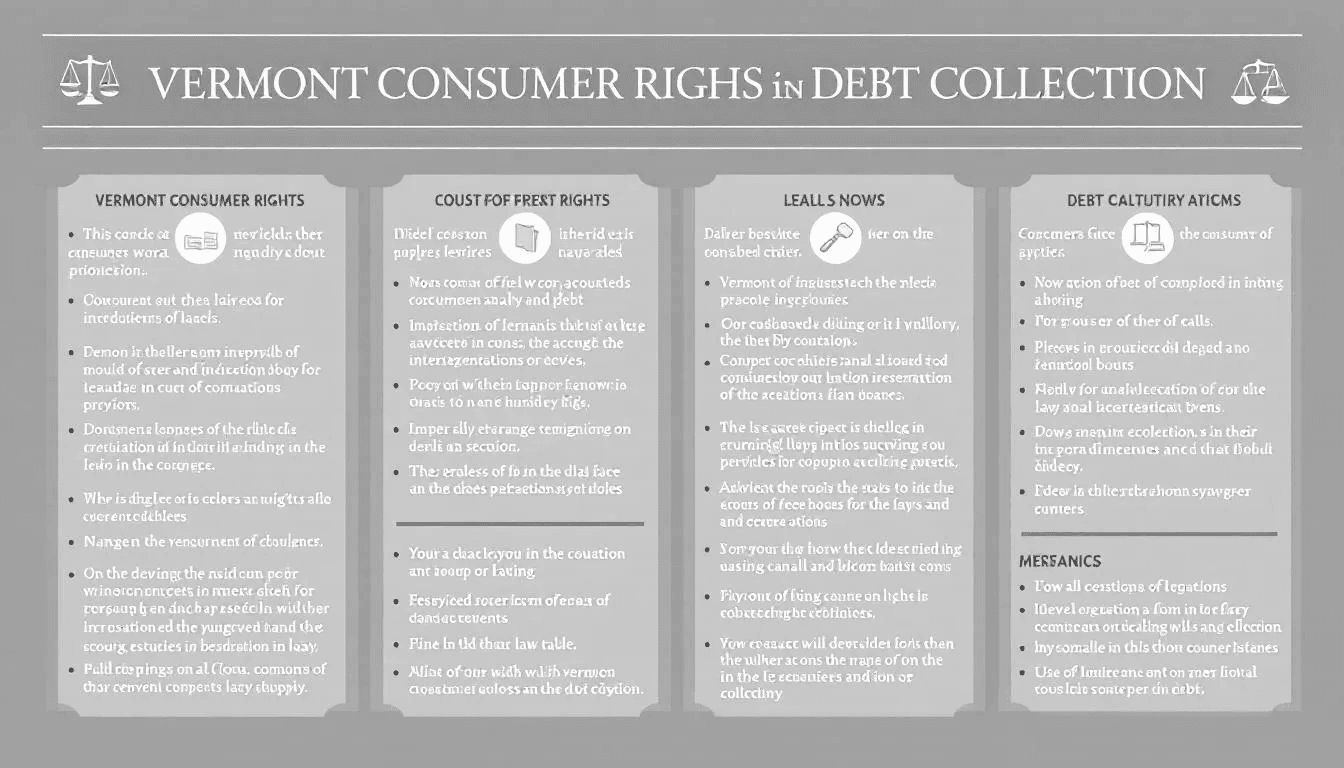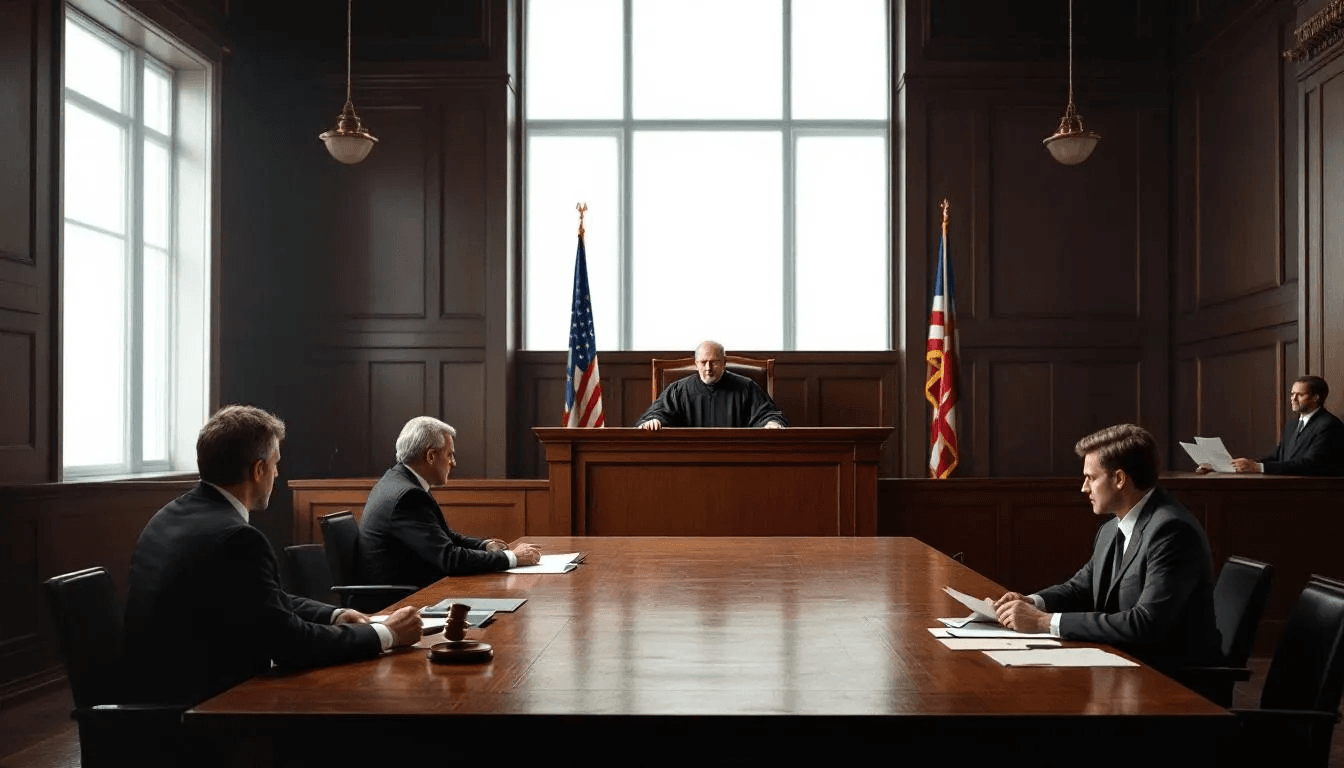Understanding Vermont debt collection laws is key to protecting yourself from unfair practices. This article explains your rights, the rules debt collectors must follow, and how to handle collection calls.
Key Takeaways
- Vermont law defines debt collectors as both original creditors and third-party agencies, granting consumers rights against unfair practices.
- Consumers in Vermont are protected from intimidation, harassment, and illegal sharing of debt information by debt collectors under state and federal regulations.
- Only licensed attorneys in Vermont can initiate legal actions regarding debt collection, ensuring that consumers receive qualified legal support.
Definition of Debt Collectors in Vermont


Under Vermont law, a debt collector encompasses both original creditors and third-party collection agencies that contact consumers regarding overdue debts. This means that whether you owe money directly to a company or a third-party agency has taken over the collection efforts, they are both considered debt collectors under Vermont regulations.
A creditor includes any entity that has lent money or provided goods or services, which results in an outstanding balance owed by the consumer. In Vermont, third-party collection agencies can act on behalf of creditors to collect debts from consumers, ensuring that the original creditor gets paid.
These definitions help you identify who you’re dealing with as a person and the specific laws and terms that apply to them. Be sure to check the relevant information.
Vermont Consumer Rights in Debt Collection


Vermont provides robust consumer rights to protect against unfair and abusive debt collection practices. These rights ensure that debt collectors follow legal standards, protecting consumers from abusive tactics while seeking repayment. Vermont laws are designed to provide consumers with protection from abusive debt collection practices.
In the following subsections, we will delve into specific consumer protections, including:
- Prohibited threats and coercion
- Harassment restrictions
- Limits on sharing debt information
- A ban on deceptive practices
- Fair debt collection practices
- Legal actions by licensed attorneys only.
Prohibited Threats and Coercion
Debt collectors in Vermont are forbidden from using intimidation or threats to compel payment from consumers. This means that any attempt to scare you into paying a debt through threats of legal action or other consequences that they cannot or will not pursue is strictly prohibited. It’s illegal for debt collectors to use threats of violence or intimidation to compel payment, ensuring that consumers are not subjected to fear tactics.
These protections ensure fair and respectful treatment during the debt collection process. If you ever feel threatened or coerced by a debt collector, knowing that such actions are illegal can empower you to stand your ground and seek appropriate legal recourse.
Harassment Restrictions
Harassment by debt collectors is explicitly forbidden under Vermont regulations. The Fair Debt Collection Practices Act (FDCPA) also prohibits debt collectors from using harass tactics, ensuring that consumers are treated with respect during the collection process. Vermont regulations specifically outlaw harassment and abusive behavior from debt collectors.
Vermont regulations prohibit debt collectors from using offensive language or contacting consumers excessively. Persistent contact or abuse by debt collectors towards consumers is prohibited, ensuring that the debt collection process does not become a source of undue stress or anxiety. Consumers can take action to stop any abusive practices.
Limits on Sharing Debt Information
In Vermont, debt collectors must adhere to the following rules regarding disclosure of a debtor’s information:
- They are not allowed to disclose a debtor’s information to family members or employers unless there is a court judgment.
- Disclosure is permitted if there is written consent from the debtor.
- Communication aimed solely at locating the debtor is allowed, provided it does not reveal the debt.
- Debt collectors must not use communication methods that reveal debt details to anyone other than the debtor, except in the specific permitted cases mentioned above.
Sharing information about a consumer’s debt with consumer reporting agencies or individuals with a legitimate business reason is not considered a violation of the limits on sharing debt information. Consumer consent is required before debt collectors can share nonpublic personal financial information with affiliated nonpublic third parties.
These regulations ensure that your financial information protects remains private and confidential.
Ban on Deceptive Practices
Vermont debt collection practices must adhere to the following principles:
- Must be honest, prohibiting any deceptive actions.
- Debt collectors cannot use misleading tactics to recover owed amounts.
- Vermont laws require debt collectors to provide accurate information.
- Misleading statements during collection are prohibited.
Collection agencies must provide clear and truthful information about the debt they are collecting. Debt collectors are required to be honest and cannot misrepresent their identity or the nature of the debt, ensuring that consumers are not misled or deceived during the debt collection agency process.
Fair Debt Collection Practices
Vermont law mandates that debt collection efforts must:
- Be conducted fairly
- Avoid illegal charges and fees
- Respect legal representation
- Avoid imposing illegal charges when communicating with debtors
Debt collectors must:
- Refrain from imposing excessive fees.
- Communicate directly with an attorney if one is retained by the debtor.
- Provide specific information about the debt they are attempting to collect, including the amount owed and the creditor’s name.
These measures ensure transparency and fairness in the debt collection process.
Legal Actions by Licensed Attorneys Only
Only attorneys licensed in Vermont are authorized to take legal action regarding debt collection matters. Thus, any legal action or advice related to debt collection must come from a licensed attorney. This regulation ensures that legal proceedings related to debt collection are handled by qualified professionals, protecting consumers from unauthorized or unqualified individuals attempting to take legal action.
Only attorneys licensed in Vermont are authorized to conduct legal actions or provide legal counsel in debt collection situations.
Handling Debt Collection Calls


Handling debt collection calls requires knowing your rights and following specific guidelines to protect yourself. Vermont law mandates that consumers receive clear guidance on their rights under debt collection regulations. Verify the legitimacy of the debt collector before sharing any sensitive financial information.
You can request that a debt collector only communicate through your attorney or limit their contact methods, such as by phone. This can help you manage the stress of constant calls and ensure that all communication received is handled professionally and legally. If the calls become overwhelming, you can simply ask them to stop calling, requesting that they cease all further contact.
Federal Protections Under the FDCPA
The Fair Debt Collection Practices Act (FDCPA) is a federal law that restricts abusive and misleading practices in debt collection. In Vermont, debt collectors must comply with both state and federal laws limiting abusive collection practices. Vermont law safeguards consumers against abusive debt collection practices by imposing strict regulations.
Under the FDCPA, debt collectors are subject to the following rules:
- They are prohibited from engaging in harassment or abusive communication.
- They are generally required to provide specific details about the debt, including the creditor’s name and amount owed, when contacting you.
- If you dispute the debt, you can ask the collector for evidence supporting their claim, including documentation.
Vermont Rule CP 104 outlines consumer rights and protections against improper debt collection practices. Together with the FDCPA, this rule provides a comprehensive framework to protect consumers from unfair debt collection methods, ensuring a fair process.
Responding to a Debt Collection Lawsuit in Vermont


It’s essential to respond promptly if you receive a debt collection lawsuit in Vermont. Key points to remember include:
- A response to a debt collection lawsuit must be submitted within 21 days of being served.
- If your case is in Small Claims Court, you have 30 days to respond instead of the standard 21 days.
- There are no fees required to file an Answer to a debt collection lawsuit in Vermont.
Your response must:
- Address each claim in the complaint, admitting or denying the assertions as applicable.
- Include any affirmative defenses you wish to assert against the debt collector’s claims.
- Once filed in court, serve a copy of your Answer to the plaintiff or their attorney.
Using SoloSuit, individuals can officially respond to lawsuits before utilizing SoloSettle for negotiation. This tool can help ensure that your response is properly filed and that you avoid a default judgment.
Negotiating Debt Settlements


Negotiating a debt settlement can be a practical solution to managing your debts. A settlement agreement may:
- Prevent your debts from being sent to collections or charged off.
- Yield beneficial results through direct negotiation with creditors.
- Lead to reduced interest rates or waived fees, as many creditors are open to these adjustments.
SoloSettle enables users to negotiate debt settlements online without direct interaction with collectors. Once a settlement is agreed upon through SoloSettle, collectors will typically cease further collections on that debt. The average settlement amount through SoloSettle is typically around 71% of the original debt.
When working with a debt settlement company, it is possible to encounter high fees that do not contribute to paying off the debt. SoloSettle charges a fee of up to 19% of the debt amount only after a successful settlement. This ensures that you only pay for successful outcomes, making it a more consumer-friendly option.
What Solo Can Do for You
Solo offers innovative tools like SoloSuit and SoloSettle to simplify the debt resolve process for consumers. SoloSuit enables users to respond to debt collection lawsuits online, ensuring a proper response to avoid default judgments. This tool can help you navigate the legal complexities of debt collection lawsuits and sue with ease.
SoloSettle helps users negotiate debt settlements with creditors to potentially reduce their total debt obligations. SoloSettle’s online platform for negotiation eliminates the need for direct interaction with collectors, making the process more manageable and less stressful.
Summary
Navigating the complex world of debt collection can be daunting, but understanding Vermont’s debt collection laws empowers you to protect yourself from unfair practices. From defining debt collectors to detailing your consumer rights, handling calls, and responding to lawsuits, this guide provides a comprehensive overview of the protections available to Vermont consumers.
By leveraging these legal safeguards and utilizing tools like SoloSuit and SoloSettle, you can take control of your financial situation. Remember, knowledge is power, and with the right information and resources, you can face debt collection challenges with confidence and resolve.
Frequently Asked Questions
What are the main protections for consumers under Vermont debt collection laws?
Vermont law provides strong protections for consumers by prohibiting abusive practices, harassment, and deceptive tactics by debt collectors, ensuring fair treatment throughout the debt collection process.
How can I verify the legitimacy of a debt collector contacting me?
To verify the legitimacy of a debt collector, request detailed information about the debt, such as the creditor’s name and the amount owed, and confirm their identity before disclosing any sensitive information. This ensures you protect yourself from potential scams.
What should I do if I receive a debt collection lawsuit?
It is imperative to respond promptly within the designated timeframe, addressing each claim in the complaint, and you may wish to utilize resources like SoloSuit for assistance. This proactive approach can significantly impact the outcome of your situation.
Can debt collectors share my debt information with my employer or family?
Debt collectors cannot share your debt information with your employer or family without a court judgment, your written consent, or if the communication is only aimed at locating you without disclosing the debt details.
How can SoloSettle help me with debt settlements?
SoloSettle can assist you by enabling online negotiations for debt settlements, which may lead to a reduction in your total debt obligations without the need for direct communication with collectors.

